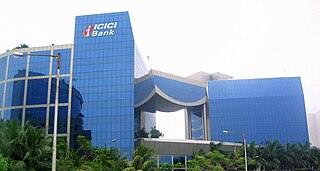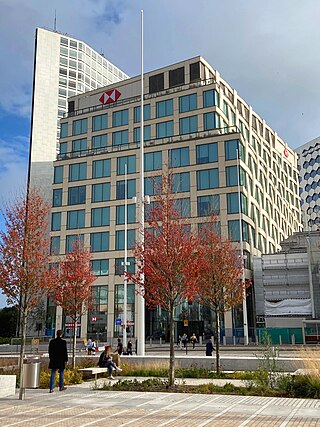
Financial services are economic services tied to finance provided by financial institutions. Financial services encompass a broad range of service sector activities, especially as concerns financial management and consumer finance.

Kiwibank Limited is a New Zealand state-owned bank and financial services provider. As of 2023, they are the fifth-largest bank in New Zealand by assets, and the largest New Zealand-owned bank, with a market share of approximately 9%.

Bank of New Zealand (BNZ) is one of New Zealand's big four banks and has been operating in the country since the first office was opened in Auckland in October 1861 followed shortly after by the first branch in Dunedin in December 1861. The bank operates a variety of financial services covering retail, business and institutional banking and employs over 5,000 people in New Zealand. In 1992 the bank was purchased by the National Australia Bank and has since then operated as a subsidiary, but it retains local governance with a New Zealand board of directors.

ICICI Bank Limited is an Indian multinational bank and financial services company headquartered in Mumbai with registered office in Vadodara. It offers a wide range of banking and financial services for corporate and retail customers through a variety of delivery channels and specialized subsidiaries in the areas of investment banking, life, non-life insurance, venture capital and asset management.
Banking in Australia is dominated by four major banks: Commonwealth Bank, Westpac, Australia & New Zealand Banking Group and National Australia Bank. There are several smaller banks with a presence throughout the country which includes Bendigo and Adelaide Bank, Suncorp Bank, and a large number of other financial institutions, such as credit unions, building societies and mutual banks, which provide limited banking-type services and are described as authorised deposit-taking institutions (ADIs). Many large foreign banks have a presence, but few have a retail banking presence. The central bank is the Reserve Bank of Australia (RBA). The Australian government’s Financial Claims Scheme (FCS) guarantees deposits up to $250,000 per account-holder per ADI in the event of the ADI failing.

Second mortgages, commonly referred to as junior liens, are loans secured by a property in addition to the primary mortgage. Depending on the time at which the second mortgage is originated, the loan can be structured as either a standalone second mortgage or piggyback second mortgage. Whilst a standalone second mortgage is opened subsequent to the primary loan, those with a piggyback loan structure are originated simultaneously with the primary mortgage. With regard to the method in which funds are withdrawn, second mortgages can be arranged as home equity loans or home equity lines of credit. Home equity loans are granted for the full amount at the time of loan origination in contrast to home equity lines of credit which permit the homeowner access to a predetermined amount which is repaid during the repayment period.
Tesco Personal Finance plc, trading as Tesco Bank, is a British retail bank which was formed in July 1997, and which has been wholly owned by Tesco plc since 2008. The bank was formed as part of a 50:50 joint venture between The Royal Bank of Scotland and Tesco, the largest supermarket in the United Kingdom.

HSBC UK Bank plc is a British multinational banking and financial services organisation based in Birmingham, England. It is a wholly owned subsidiary of the global HSBC banking and financial group, which has been headquartered in London since 1993. The UK headquarters of HSBC is located at One Centenary Square in Birmingham.
HSBC Finance Corporation is a financial services company and a subsidiary of HSBC Holdings. It is the sixth-largest issuer of MasterCard and Visa credit cards in the United States. HSBC Finance Corporation was formed from the legal entity that had been known as Household International—shortly after Household International settled for US$486 million in charges pertaining to predatory lending, after burning through $389 million in legal fees and expenses—and is now expanding its consumer finance model via the HSBC Group to Brazil, India, Argentina and elsewhere.
Payment protection insurance (PPI), also known as credit insurance, credit protection insurance, or loan repayment insurance, is an insurance product that enables consumers to ensure repayment of credit if the borrower dies, becomes ill or disabled, loses a job, or faces other circumstances that may prevent them from earning income to service the debt. It is not to be confused with income protection insurance, which is not specific to a debt but covers any income. PPI was widely sold by banks and other credit providers as an add-on to the loan or overdraft product.

Vanquis Banking Group, formerly Provident Financial plc, is a British bank headquartered in Bradford, England which specialises in credit cards, loans and consumer vehicle finance. It primarily services customers with a sub-prime credit history who have been declined for credit from mainstream lenders. It also offers fixed-rate and notice savings accounts under the trading name Vanquis Savings. It is listed on the London Stock Exchange.

The industry which has a range of businesses that deal with money like banks, insurance companies, accounting companies, finance companies, taxation, investment funds, credit companies, and few government enterprises is called the finance industry. The activities or services within this industry that cater to the economy of the country are called financial services. Therefore, the economic services provided by the finance industry in Japan are called financial services in Japan. These services are present across the world, at regional, international and national level developed economic and demographic regions such as Sydney, New York, London, Tokyo, etc.
China's banking sector had CN¥319.7 trillion in assets at the end of 2020. The "big four/five" state-owned commercial banks are the Bank of China, the China Construction Bank, the Industrial and Commercial Bank of China, and the Agricultural Bank of China, all of which are among the largest banks in the world As of 2018. The Bank of Communications is sometimes included. Other notable big and also the largest banks in the world are China Merchants Bank and Ping An Bank.

A credit card is a payment card, usually issued by a bank, allowing its users to purchase goods or services or withdraw cash on credit. Using the card thus accrues debt that has to be repaid later. Credit cards are one of the most widely used forms of payment across the world.

Westpac Banking Corporation, known simply as Westpac, is an Australian multinational banking and financial services company headquartered at Westpac Place in Sydney, New South Wales.

Citibank Berhad is a licensed commercial bank operating in Malaysia with its headquarters in Jalan Ampang, Kuala Lumpur. Citibank Berhad operates as a subsidiary of Citigroup Holding (Singapore) Private Limited, commencing its banking operations in Malaysia since 1959. Citibank Berhad was locally incorporated in 1994. Citibank Berhad has 11 branches spread across Kuala Lumpur, Selangor, Penang, Kuantan, Malacca and Johor, offering a wide range of banking and financial services including retail banking, institutional banking, and investment products and services.

A bank is a financial institution that accepts deposits from the public and creates a demand deposit while simultaneously making loans. Lending activities can be directly performed by the bank or indirectly through capital markets.

ME Bank, also known as ME, is an Australian direct bank based in Melbourne. ME Bank no longer has branches in Sydney, Brisbane, Adelaide, Perth, Hobart, Canberra and Darwin. It became a subsidiary of Bank of Queensland in July 2021.
Marks & Spencer Financial Services plc, trading as M&S Bank, is a retail bank operating in the United Kingdom. Founded in 1985 as St Michael Financial Services as the financial services division of Marks & Spencer and adopted its current name in 2012.

ING Bank (Australia) Limited is a direct bank operating in Australia. It is a wholly owned subsidiary of the multinational Dutch bank, ING Group. ING in Australia holds an Australian banking licence as a foreign subsidiary company.














